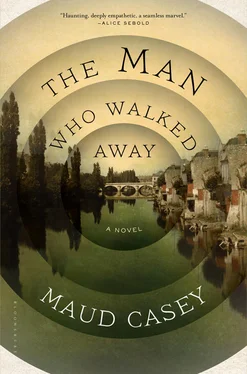“Are you taking me to the cottage?” Albert asks.
“You will be safer here.” The lamplighter does not tell Albert that his home no longer exists, and Albert does not ask. The cottage where he and his father used to live, the cottage by the river, caught fire when a neighbor’s gas lamp was blown over by the wind. A whole row of cottages, burned to the ground. He gives Albert a gentle push. “Go,” he says. He is a kind man, a loyal man, but he cannot bear to involve himself again. It was years ago, but the time he tied Albert to his bed still lingers; it did no good. Nothing ever has. It is more than his goodwill this boy who hasn’t been a boy for years needs, and so the lamplighter leans through the bars of the iron gates to call to a large man who appears to work here. “Will you let us in?”
A nurse who seems to glide just above the earth will take Albert by the arm and lead him through the empty courtyard of the asylum. “We will feed you,” she will say. “But first you must rest.” He will hear a woman crying out that her stockings have fallen down again; a man crying, “Fuck, fuck, fuck,” and making the sound of a shooting gun; a doctor calling for a nurse; the bell attached to the giant clock of St. Eloi’s ringing in the hour, and then another bell. Altogether, these sounds will create a new sound. Albert will listen to the new sound as the nurse leads him down a long hall. “We will find you a room,” she will say, and this will become part of the music too.
How could he know that someday the word for the convergence of these sounds— fugue —will also describe the sound of his astonishment and his anguish, the sound they make when they are played together?
It doesn’t matter. It has been so long since he has heard any song but his own; he had forgotten there were others.
Listen .
In the center of the public garden there is a lake, and in the center of the lake float a gaggle of sleeping geese, heads tucked beneath their wings. Each morning, the Doctor aspires to ride his bicycle so smoothly that its mechanical whisper — click-clickety-click — doesn’t wake the geese. With great concentration, he rides past the garden’s newly imported Spanish chestnut trees, the bicycle often trembling as it does now. The trees were a scandal when they first arrived. The story went that in an effort to keep up with that other gleaming city, the leaders of Bordeaux had purchased the trees at enormous expense. As if to punish this luxurious act of vanity, droves of rats immediately took up residence in the rich soil, scrambling over one another to fight for each fallen chestnut, upstaging the beautiful, expensive trees.
“Femur. Humerus,” the Doctor whispers. “Supraorbital foramen.” The sound of the words steadies him; it travels down through his skeleton into the metal, whispering back to the machine.
It’s worth the few small bugs he swallows to recite the words aloud. “Lacrimal bone,” he says again, in an effort to erase the sound of his sneeze in the amphitheater. Over and over, he’s replayed it. Here I am. He wasn’t afraid. He wasn’t sorry. Why had he apologized? He hadn’t slept well last night after he returned from the docks, the keening of the great doctor’s girl still in his head.
“Lacrimal,” he says again. It is one of his favorite words: Lacrimal, lacrimal, lacrimal . The exquisite almond-shaped glands, an entire apparatus devoted to tears, keeping the eye moist and free of dust and also shedding the other sort of tears, the kind he was shocked to find himself shedding in the early morning hours. “Don’t be a stranger,” the bartender shouted as the Doctor climbed the stairs to his apartment when he returned from the docks, but he was a stranger, even to himself. There weren’t many tears; still, he didn’t understand them precisely. Lacrimal. Tears of a protective nature and the more mysterious kind passing through tiny openings in the corner of his eye, then into his lacrimal canaliculus, through a small sac and into his nasolacrimal duct, and into his nasal cavity. Lacrimal , one of his favorite bones: Lacrimal, lacrimal, lacrimal. The most fragile bone in the body. The hyoid bone — the horseshoe-shaped bone at the base of his tongue, which he did not think of as he ran his tongue over the woman’s hip last night — was nearly as fragile, but the lacrimal bone was the most delicate. Lacrimal. An elegant word, really, and there, at its core, the mystery of the water that he found on his face in the early morning hours as he lay in his bed unable to sleep. Mother, I am frightened. The girl’s voice, still with him, the look on her face that resembled love but wasn’t love at all but a kind of decoy. A decoy that distracted from a question: What is the story of my invisible life?
“Lacrimal, lacrimal, lacrimal.”
Click-clickety-click. The pleasure is the system; the system is the pleasure. If only he had invented the bicycle. Even to have invented the clever pedal! One day, some rich man had brought his draisienne , a mere toy, an oddity hobbyhorse made of wood, to the blacksmith for repair. How had Michaux known to use cranks to connect pedals to the front wheels? The sharp beauty of that idea must have sliced so cleanly through his mind. Pedals led to the use of ball bearings to make a free wheel, and then to the invention of individual spokes to link the hub to the rim. Soon after, wooden frames and then solid rubber tires replaced the wooden ones for better shock absorption, and then gears. The creation of the metal machine the Doctor rode now was a series of perfect discoveries. And now here he is, balancing miraculously on two wheels, an elegant example of the beauty of progress.
He rides out of the garden, past the flickering gas lamps soon to be snuffed out by the lamplighter (it is that early still). He imagines they are doing their flickering dance just for him. Bravo, Doctor. Bravo , they flicker. Thank you , the Doctor whispers back. Thank you. It was nothing, really.
Then past the stern stone justices on the top of the Palace of Justice: And? So? Past the witchy-looking woman outside the small stone church of St. Eulalie, who is in a particular twist this morning. “Unspeakable, the things that man has done!” she is saying, but when she sees him she says sweetly, “Good morning, Doctor.” He has always appreciated that she interrupts her harangues to greet him politely.
“Good morning,” he says, and as he slips off his bicycle and rolls it through the iron gates into the still air of the asylum courtyard, he feels once again the buoying optimism of the wind. His work doesn’t require of him that he make a perfect discovery like Michaux’s. He doesn’t need to invent the clever pedal. He doesn’t need to resurrect an ancient word and refashion it for the ages. What is required of him here is subtler than that. Mother, I am frightened. He needs to listen to the words. He needs to listen past the words.
“Stop that,” says a familiar voice.
“But I haven’t even begun,” says the Doctor.
Marian sits on one of the wooden benches along the path lined with silver birch trees, as she likes to do on the mornings she is feeling bold. She sits with Claude, underneath one of the stained-glass windows left over from the asylum’s days as a church, the Redemption window depicting the Ascension and Jesus on the road sparkling red, yellow, and blue to Cavalry.
“Why did you do that for no reason?” she asks. Last night the sun stole her other kidney.
Behind her words, for example, the Doctor knows, is a father, a wine merchant, who rejoiced when she agreed to marry a rival’s son for the sake of good business, but when her new husband, anxious to begin a family, asked her why she was always too tired to make love, Marian confided her suspicion. When she slept, the sun, who had everyone duped into believing it had set, had been replacing her heart with a substitute heart. Behind her words is Marian explaining to her husband she had tried to stay awake all night in order to prevent the theft but she failed; behind her words are other words, “I am so tired,” she said to her husband, and then her face, her arms, her legs, the entire left side of her body went stiff with paralysis. But her husband wasn’t listening; he was busy packing her bag.
Читать дальше












